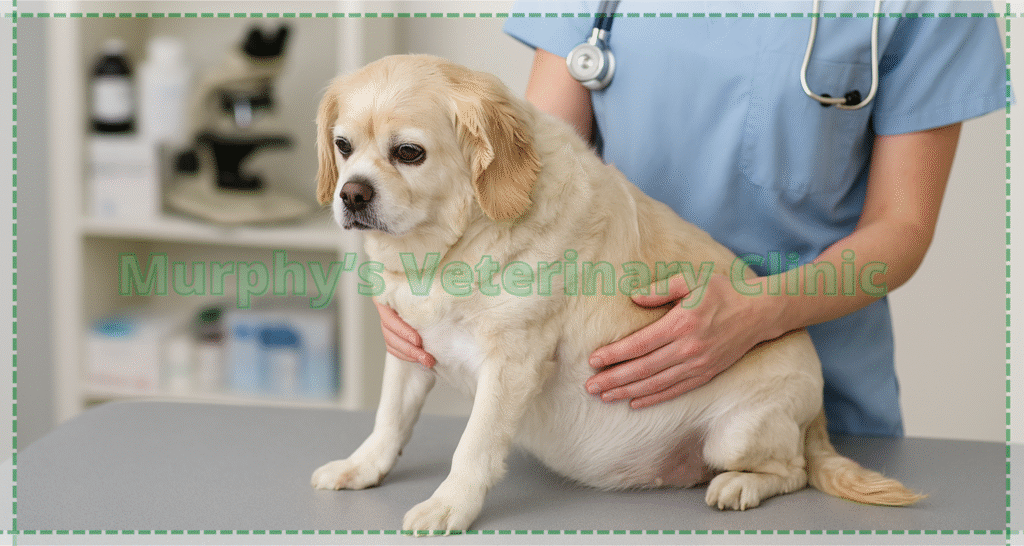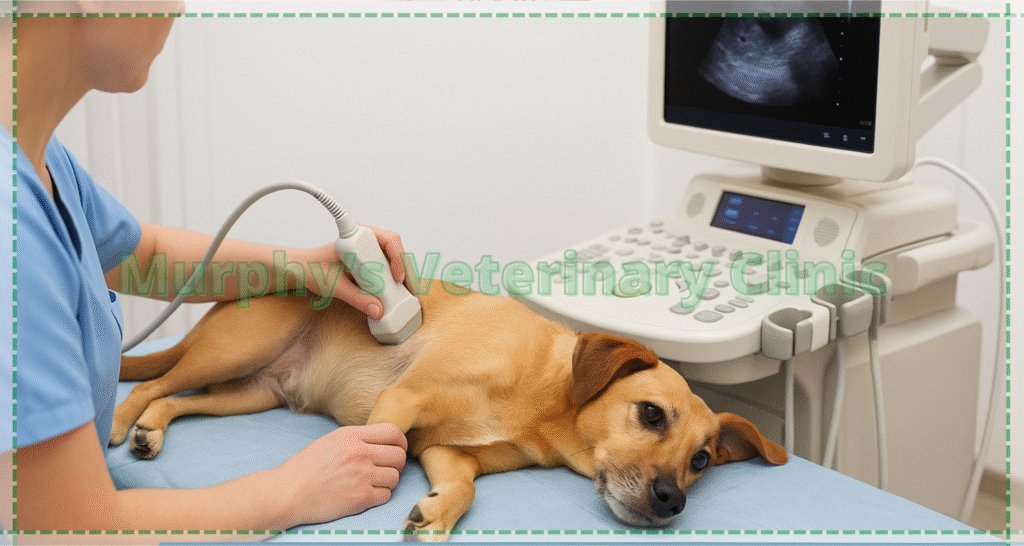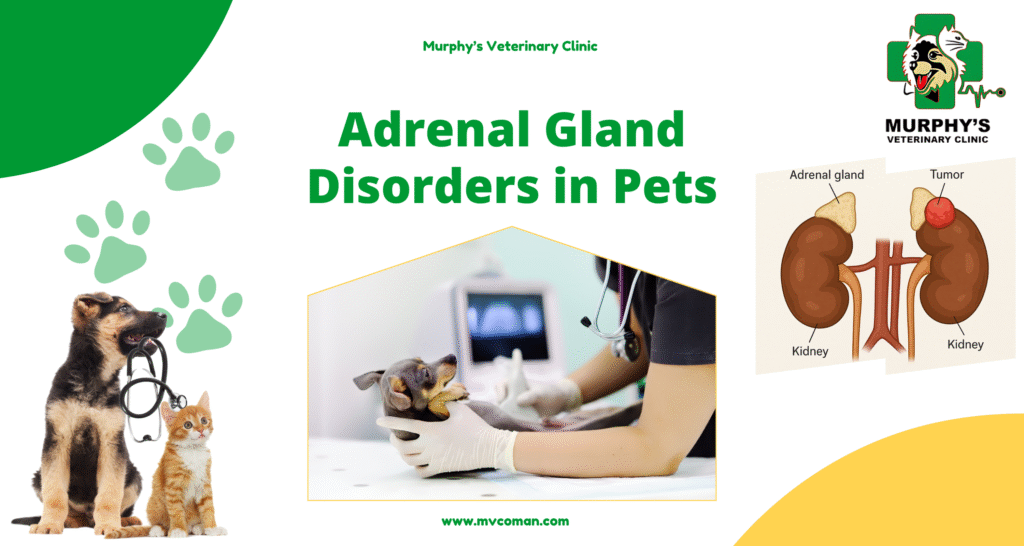Diseases & Treatments, Veterinary Science & Advances
Adrenal Gland Disorders in Pets
Topics covered in this article:
- Cushing’s Disease (Hyperadrenocorticism)
- Addison’s Disease (Hypoadrenocorticism)
- Adrenal Tumors
- Imaging Diagnostics in Adrenal Gland Disorders in Pets
- Impact of Adrenal Gland Disorders in Pets on Overall Health
- Conclusion
Adrenal gland disorders in pets are among the most complex hormonal issues that can significantly affect an animal’s overall health. Located above the kidneys, the adrenal glands are responsible for producing essential hormones like cortisol and aldosterone, which regulate blood pressure, water and electrolyte balance, metabolism, and immune system function. Any disruption in these glands can lead to vague but serious symptoms such as fatigue, behavioral changes, growth issues, and digestive problems. The most common adrenal gland disorders in pets include Cushing’s disease, Addison’s disease, and adrenal tumors. Accurate diagnosis requires advanced imaging tools like ultrasound, CT scans, and MRI. This article provides an in-depth review of these disorders, their symptoms, diagnostic methods, and treatment options.

Cushing’s Disease (Hyperadrenocorticism)
Cushing’s disease is one of the most prevalent adrenal gland disorders in pets, characterized by the excessive production of cortisol. It usually results from a tumor in the pituitary gland or the adrenal glands themselves. Symptoms include increased appetite, excessive drinking and urination, a pot-bellied appearance, thin skin, and reduced mobility. These signs are often mistaken for aging, causing delays in diagnosis. Blood and urine tests, along with abdominal imaging, are used to confirm the disease. Treatment may involve medications to reduce cortisol levels or surgery to remove tumors. Early identification significantly improves a pet’s quality of life.
- Increased water intake and urination
High cortisol affects kidney function, leading to excessive thirst and frequent urination. - Pot-bellied appearance and fat distribution
Fat accumulation in the abdomen causes the belly to sag unnaturally. - Thinning of the skin and hair loss
Cortisol weakens the skin, leading to noticeable hair loss and fragile skin. - Behavioral changes
Pets may become either lethargic or more irritable due to hormonal imbalances.

Addison’s Disease (Hypoadrenocorticism)
Addison’s disease is a condition in which the adrenal glands fail to produce enough cortisol and aldosterone. This is one of the more serious adrenal gland disorders in pets, with symptoms like weight loss, extreme fatigue, vomiting, and even Addisonian crisis (shock). Its symptoms are often mistaken for other common illnesses, delaying diagnosis. Blood tests showing low sodium and high potassium are key indicators. Treatment involves hormone replacement therapy and ongoing monitoring. Without timely intervention, Addison’s disease can be life-threatening.
- Loss of appetite and weight
Pets with Addison’s become disinterested in food and lose weight rapidly. - Weakness and lethargy
Animals appear unusually tired, less active, and may sleep excessively. - Frequent vomiting and diarrhea
Digestive issues are persistent due to poor electrolyte regulation. - Severe blood pressure fluctuations
Some pets experience dangerously low blood pressure and risk of shock.

Adrenal Tumors
Adrenal tumors may be benign or malignant and can be hormone-secreting or non-functional. These tumors are significant contributors to adrenal gland disorders in pets, potentially disrupting surrounding organs or hormone levels. Symptoms include abnormal drinking habits, muscle tremors, high blood pressure, and weight gain. Imaging like CT and MRI is essential for diagnosis. Treatments range from surgical removal to chemotherapy for malignant cases.
| Tumor Type | Hormone-Secreting? | Common Hormone | Benign/Malignant | Diagnostic Method |
| Adrenal Adenoma | Yes | Cortisol | Benign | Ultrasound / CT |
| Adrenal Carcinoma | Yes | Cortisol/Androgens | Malignant | Ultrasound / CT / MRI |
| Non-functional Tumor | No | — | Often benign | Ultrasound / CT or MRI |

Imaging Diagnostics in Adrenal Gland Disorders in Pets
Imaging plays a vital role in diagnosing adrenal gland disorders in pets. These techniques allow veterinarians to closely examine the structure, function, and potential tumors or abnormalities within the adrenal glands. From abdominal ultrasound to MRI and contrast imaging, each method provides valuable insights to support an accurate diagnosis. The choice of imaging depends on the pet’s symptoms and clinical needs.
Abdominal Ultrasound
Helps assess gland size and detect early abnormalities.
CT Scan
Offers detailed views of tumors and surrounding tissues with high precision.
MRI
Useful for evaluating tumor spread to the brain or nerves.
Contrast Imaging
Assesses adrenal blood supply and gland function dynamically.

Impact of Adrenal Gland Disorders in Pets on Overall Health
Adrenal gland disorders in pets can affect nearly every aspect of their physical and mental well-being. Hormonal imbalances weaken the immune system, disrupt metabolism, and lead to behavioral changes. These conditions ultimately result in a lower quality of life, making even simple daily activities difficult for the animal. The table below summarizes these impacts clearly and concisely:
| Health Impact | Description |
|---|---|
| Weakened Immune System | Abnormal hormone levels reduce the body’s ability to fight off infections. |
| Disrupted Metabolism | Irregular growth, sudden weight changes, and fluctuations in energy are common. |
| Behavioral Disturbances | Anxiety, depression, restlessness, or aggression often stem from hormonal shifts. |
| Lower Quality of Life | Decreased activity, poor appetite, and digestive problems reduce daily engagement. |
Conclusion
Adrenal gland disorders in pets are serious medical conditions that require early diagnosis and targeted treatment. Conditions like Cushing’s and Addison’s disease are manageable with proper medical attention, especially when detected early. Imaging technologies such as ultrasound and CT are essential for accurately identifying abnormalities in the adrenal glands. Owners should remain alert to physical and behavioral changes in their pets, and consult a veterinarian if symptoms arise. Medications, surgery, and long-term follow-up care help improve the pet’s condition and longevity. With proper management, pets with adrenal gland disorders can live a healthy and comfortable life.
At Murphy’s Veterinary Clinic, we offer specialized diagnostic and treatment services for adrenal gland disorders in pets. Our advanced imaging equipment, including ultrasound and CT, along with expert veterinary care, ensures early and accurate diagnosis. From hormone evaluations to surgical intervention, we’re here to support your pet’s health every step of the way. If your pet shows signs of hormonal imbalance, Murphy’s is your trusted partner for care and recovery.


